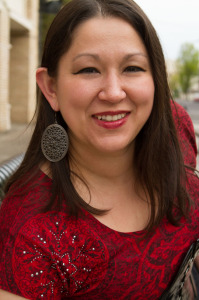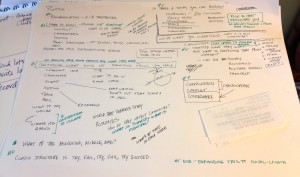
 Recently, Ryan Boudinot wrote an essay for The Stranger titled “Things I Can Say About MFA Writing Programs Now That I No Longer Teach in One“. Among other things, he observed:
Recently, Ryan Boudinot wrote an essay for The Stranger titled “Things I Can Say About MFA Writing Programs Now That I No Longer Teach in One“. Among other things, he observed:
Either you have a propensity for creative expression or you don’t. Some people have more talent than others. That’s not to say that someone with minimal talent can’t work her ass off and maximize it and write something great, or that a writer born with great talent can’t squander it. It’s simply that writers are not all born equal. The MFA student who is the Real Deal is exceedingly rare, and nothing excites a faculty adviser more than discovering one. I can count my Real Deal students on one hand, with fingers to spare.
This is, in my opinion, wrong-headed, elitist, and insulting. Other people have replied eloquently. Chuck Wendig said:
This is one of the worst, most toxic memes that exists when it comes to writers. That somehow, we slide out of the womb with a fountain pen in our mucus-slick hands, a bestseller gleam in our rheumy eyes. We like to believe in talent, as if it’s a definable thing “” as if, like with the retconned Jedi, we can just take a blood test and look for literary Midichlorians to chart your authorial potential. Is talent real? Some genetic quirk that makes us good at one thing, bad at another? Don’t know, don’t care.
...

(Warning: there is a terrible pun below. If you are allergic to groaning please enjoy this cartoon instead. http://youtu.be/ykwqXuMPsoc)
When I decided that I wanted to be a writer when I grew up I started collecting writing advice. Not tidbits from websites or manuals written by literati who wouldn’t touch a genre novel with a ten-foot pole. I went to my favorite authors, batted my puppy dog eyes, and said, “Please sir, I’d like some more.”
All right, I didn’t have to be that persuasive. Good thing too. I was so nervous I looked like Shaggy on espresso. Anyway”¦
One of the pieces of advice I received most often was “don’t give up” or some variation thereof. At that point in time I was still pretty naive. I had yet to complete my first story, I didn’t know about the caprices of the market, or the sting of rejection. What I did know what that this was the only career I truly wanted and there was no way I would ever consider quitting.
Oh, the schadenfreude when life proves me wrong.
What I failed to understand was that sooner or later we all have that moment. There’s no magical egg timer ticking away, warning us that it’s coming. No, like a regretful ex it rings when you least expect it and fills your life with woe.
Woe, man.
(Sorry. I couldn’t resist.)
...
I’ve been having enough fun with the free version of Powtoons that I’m thinking about upgrading. Here’s a video for the flash fiction that I’m 90% happy with. Please like it or share it if you enjoy it.
...

For example. The last few days I’ve been working at getting back into the flow of writing daily. I held myself accountable and post daily word counts here or on Twitter. And lemme tell you, some of those words were difficult to wrestle out of my skull and onto the page. One way I can tell things are going in difficult fits and spurts is that I’ll hop around a lot from story to story.
One of those projects is “Prairiedog Town” (which is definitely getting a different title). I started jotting down mental notes for it while traveling through Kansas, but only had a thousand words or so on it before last week. It was slow writing, partially because I wasn’t sure how I was getting from one point to another in the story. I knew it was a piece about a woman reclaiming her humanity and I had a good idea of what the penultimate scene would look like.
So I kept jotting words down in sporadic clumps of a few hundred at a time, yerking the story along in an awkward and impatient way. It helped when I incorporated a prompt from Sandra M. Odell, a woman finding an abandoned teddy bear by the road. But it still was slow slogging. Yesterday I took a break from it.
And then, this morning, while working on it, things began to fall into place. A secondary character had popped up, and I understood how to bring her back into the story — and why. A piece that was supposed to take three days suddenly shortened into a single night, and with that, the ultimate scene came clear. I went through, pulling the threads into place as close to a thousand words came spilling out and into the story.
It’s not done yet — maybe another thousand words to go, but I’ve got a map of it, and comments where I need to go back and insert things. Here, for example, is what a section of today’s work looks like:
They end up chatting. Talia asks after father. Relates that he’s died. Talia asks if she’s going to the funeral.
No
It’s what you’d say either way, isn’t it.
That’s true
I’ll be there. On the outskirts.She freezes again. It’s an old code word they used to use, back in the days when they worked together. It’s someplace close but (some distance) to the (direction).
And most importantly at all, things have come together to a point where I’m excited about the story, feel that some clever stuff has been worked in or has had places made for it. It’ll end up being around 4-5 thousand words, and I know I’ll finish it by the end of this month, because it’s designated as the next story to go out in the Patreon campaign.
And if I hadn’t done that picking away at it — scraping those words out of my skull, even though it felt painful and awkward and uninspired — I would have never gotten to that point at all.
Enjoy this writing advice and want more content like it? Check out the classes Cat gives via the Rambo Academy for Wayward Writers, which offers both on-demand and live online writing classes for fantasy and science fiction writers from Cat and other authors, including Ann Leckie, Seanan McGuire, Fran Wilde and other talents! All classes include three free slots.
Prefer to opt for weekly interaction, advice, opportunities to ask questions, and access to the Chez Rambo Discord community and critique group? Check out Cat’s Patreon. Or sample her writing here.
...

I have never been a good swimmer. It’s quite possible I never will be. When I was a kid, my parents kept enrolling me in swimming lessons, and I kept being a terrible swimmer who refused to put my head under water. Part of it was that I’d learned by then that if I got water in my ears, an ear infection wouldn’t be far behind, so every lesson was a silent battle to avoid putting my head underwater. It wasn’t till high school, when several friends decided I would learn to swim (bless you, Ann, Ann, Anne, and Maureen), that I actually got to the point where I could float long enough to survive a (fairly brief) period if I ever fell off a boat. Couple that with an illness that made me extremely self-conscious in a swimsuit for a long time, and you can see why I just don’t get in the water very much.
So here we are in Costa Rica, with a swimming pool right outside our balcony, and a temperature that makes that pool pretty darn inviting. So I got in and splashed around, and finally decided to do a little swimming. And you know what — I liked it. I liked it a lot. And found myself going back repeatedly. Right now I’m going to finsih up this post and then go do it some more.
It took a while to get over the panicked feeling that I was falling forward, that the water wouldn’t hold me up. I kept insisting on starting on the deeper end and swimming towards the shallower, because that way if I put a foot down, I’d be able to hit the bottom. But with every time I made it all the way, it got easier. I started trusting the water (and myself) more.
I’m not claiming I’m going to become a good swimmer anytime soon, or that I’m ever going to like getting water up my nose. But I’m better at it, and certainly more confident about it. And I’ve found something that I like doing, and that I will be trying to incorporate more in my life.
And that — as with so many things in life — applies to writing. Those first attempts to do something new and scary may well be awkward and uncomfortable. In fact, they probably will. Because that’s how we learn. It’s very hard to get good at something without being pretty bad at it at first. And in doing these things, you learn to trust the universe a little more. Which I see as a pretty good thing.
So it’s a Monday morning. Here’s my challenge for you. By Friday, go write or do something that scares you. And come back and tell me what you did.
Enjoy this writing advice and want more content like it? Check out the classes Cat gives via the Rambo Academy for Wayward Writers, which offers both on-demand and live online writing classes for fantasy and science fiction writers from Cat and other authors, including Ann Leckie, Seanan McGuire, Fran Wilde and other talents! All classes include three free slots.
Prefer to opt for weekly interaction, advice, opportunities to ask questions, and access to the Chez Rambo Discord community and critique group? Check out Cat’s Patreon. Or sample her writing here.
...

But for writers, I think it’s very important to go outside it on a regular basis. For one thing, your characters are going to be outside their comfort zones, being challenged, tested, thwarted, more often than not, because one thing about comfort zones is that they can be pretty darn boring to read about. Who wants a character for which everything goes right? (This is, I will argue, why the Richie Rich comic books were pretty darn bland.) How can you write a character outside their comfort zone if you don’t know what it’s like?
And outside our comfort zone is where we learn new things, new skills, new things about ourselves. Here in Costa Rica, my Spanish skill is leaping upward in a way it wouldn’t at home, despite all my best resolutions about daily Duolingo workouts or buying books in Spanish from Amazon. And that in turn has prodded me to try some new things with it, like using one of my stories as a practice piece in translation.
This is why, when I talk to students about going into a workshop like Clarion West or Viable Paradise, I urge them to try to fail. Because you learn so much more from a story where you tried something new and failed than one where you did the same thing you always did. I wrote Zeppelin Follies while at Clarion West as my very first try at a screwball comedy, and I will confess that the first draft was a horrible mishmash of stuff. And boy did I learn a lot from that.
Fortunately, for the vast majority of writers, we like new things. New words, new vistas, new thoughts. And we find them outside that comfort zone, in a place that is frightening and exhilarating all at once. Whizzing along a zipline, diving into waters over our head, talking to strangers. If you doubt that you are brave enough to do such things, remember that you do something braver everyday by putting your writing out there for other people to look at.
Enjoy this writing advice and want more content like it? Check out the classes Cat gives via the Rambo Academy for Wayward Writers, which offers both on-demand and live online writing classes for fantasy and science fiction writers from Cat and other authors, including Ann Leckie, Seanan McGuire, Fran Wilde and other talents! All classes include three free slots.
Prefer to opt for weekly interaction, advice, opportunities to ask questions, and access to the Chez Rambo Discord community and critique group? Check out Cat’s Patreon. Or sample her writing here.
...

So here’s the breakdown and total:
650 words on Circus in the Bloodwarm Rain
673 words on “Carpe Glitter”
534 words on “Prairiedog Town” (working title)
200 words and editing finished on a story in a semi-accepted state, plus sent off to the magazine that requested the changes.
Total word count: 2058
Not too bad, particularly when I’m working on getting back into productivity’s swing.
Today’s new words in Spanish: aire acondicianado (air conditioner), apogon (power outage), ballena jorabada (humpback whale), cafetera (coffeemaker), calambur (pun), picadura de mosquito (mosquito bite), la puerta de teja metallica (screen door), reinicializar (to reset, usually a machine).
And Wayne woke me this morning to watch three whales (we think a large humpback and two smaller ones) in the surf.
...

For a long time I listen to the ocean, a background of some chirping insect, shrill arcs of sound going out against that massive, constant grumble. That is what life is like, singing out against that gray and empty grind, not caring what it sounds like, because singing is the only thing you can do.
I can feel my shoulders relaxing as I type, the guilt of several weeks (over a month, really) of getting little done, not just because of the traveling or the distractions but because I let myself get lazy and forget that what a writer does is write. If you want to call yourself one, that’s what is necessary and while that’s a hard standard to maintain consistently sometimes in the face of a multitude of crises of the mind or body or world or family, it’s one I hold myself to, first and foremost.
A confession: I am not one of those writers who “have to” write, the ones seized with such a fervid muse that they cannot exist without words spilling out of them. I envy them, and sometimes in my heart, get irritated by a smugness that is really an interpretation imposed by my own insecurities.
But I have always defined myself as a writer, even in the days when I wasn’t writing so much and was pouring all that energy into writing for an online game or technical documentation or some combination of the two. So when I don’t do it, it’s not so much that it’s the writing building up. In fact, some days I’m digging the words out, and they’re obdurately clinging to the inside of my skull so I have to wrestle them onto the keyboard. Even now, I want them to flow and they’re halting, the flow coming in fits and spurts while all the time the ocean softly roars, as though it can’t help itself at times, perhaps getting just a little too excited, a little too enthusiastic in its mutterings.
Here’s the thing. When I’m not writing consistently, when I’m not hitting solid word count on at least most of the days of the week, I feel unmoored, adrift, unsure of my center. What good is a writer who isn’t writing?
There’s also an awareness of time creeping up on me. Often I wish I’d done more with those early years “” though who would have known in all that young adult thrashing about? While I don’t want to let guilt consume me, it’s not a bad goad. I believe it was John McPhee that said any motive for writing is valid, even spite and malice.
And it’s a goal that I know is doable, to hit two thousand words “” and more when I’m being motivated, which often coincides with felicities of mind or body. I don’t worry about whether they’re bad or good, all that matters is that they’re words that actually make it from my mind to the page. Right now I’m adding these words into the count, even though I don’t usually count nonfiction, because right now the focus is warming up, priming the pump, getting myself back into that productive groove.
It’s the days when I get no word count, not even a page written in a notebook, that really bug me, so when the words are flowing, there’s a point where all is well, when I can feel myself assembling words to express what I want to say and they’re falling into place quickly, one at a time but in a constant patter, like raindrops falling on the keyboard.
So tonight is swell and good. We’re here for a month, then probably onward to another country to try a few weeks there. I can get into a routine that feels productive and which includes some of the things that help ensure my mood is good and I’m undistracted by feeling unwell, such as good solid walking bouts and not eating junk food and getting enough sleep.
So what will I work on this month?
First and foremost is finishing up the YA novel I’ve been working on, along with several stories, two for anthologies and a couple for the Patreon campaign. While the stories will be fun and I do want to get them finished, the novel is what I want to be spending most of my time doing. I’ll be posting snippets and word counts as I go, keeping myself accountable. Because that’s another thing for a writer — you have to hold yourself accountable, because there’s nothing out there, really, to do it for you.
Good writing to you all. I hope you’ll get some words today as well.
...

As always, everyone’s writing process is different and the only one I can speak with authority about is my own. So perhaps this will click for you and perhaps it won’t. I hope it does.
Certainly, there are stories that arrive complete. They appear in my head and all I have to do is write them down. This is most likely to occur during the night, meaning I can rise, go to the keyboard, and bang it all out quickly. For example, “Pippa’s Smiles” arrived complete and ready to go, though it had its roots in some thoughts I had been mulling over about gendered narratives. Unfortunately, though, that’s not usually how it works.
For me, stories can start in a number of ways.
...
 For a couple of months now, I’ve been experimenting with using Dragon Dictate for writing, both fiction and nonfiction. In fact, I’m using it to write this post.
For a couple of months now, I’ve been experimenting with using Dragon Dictate for writing, both fiction and nonfiction. In fact, I’m using it to write this post.
It’s not perfect. I do have to go back and check what I have dictated, because errors do creep in, sometimes wonderfully funny ones (as well as the occasional expletive directed at Raven when he’s crawling on me). But, I find it is a faster way to write. It works very well when I know what it is that I want to say. For free writing, I’ll still stick with pen and paper, or sometimes the keyboard. It is, by the way, incredibly handy when you are transcribing stuff that cannot be scanned in.
It’s tons better than the dictation capability on my phone. Dragon Dictate can keep up with me as I ramble along, and doesn’t ever make me pause to let it catch up.
I absolutely HAD to finish up a story yesterday (Hi Lynne, if you’re reading this). Dragon Dictate was immense help with that, for several reasons. One, I can dictate it aloud faster than I can write. Two, I used it to transcribe the notes that I’d made in various places and go over them, expanding as I went.
Generally, once I had spent a little time working with the software, and it got a chance to refine its profile for me, I have been very satisfied with the results, inconsiderate well worth the money, if only for the productivity boost.
It is odd, however, to be dictating what I say and need to put all the punctuation in. I find myself, at times, wanting to stick the punctuation in during regular speech. It makes me speak in grammatically correct sentences, compose the words in my head before I speak them, rather than just grabbing them willy-nilly and flinging them into the sentence.
I do find writing dialogue a bit of a pain in the ass. That’s because of the need to dictate the punctuation as well as the words. But I look forward to becoming more adept with the tool, and being able to edit with voice alone as well.
Before anyone asks if it’s available on a Macintosh, I am actually using it on a Mac. Have you tried any dictation software? What have your experiences been?
...
Want access to a lively community of writers and readers, free writing classes, co-working sessions, special speakers, weekly writing games, random pictures and MORE for as little as $2? Check out Cat’s Patreon campaign.

"(On the writing F&SF workshop) Wanted to crow and say thanks: the first story I wrote after taking your class was my very first sale. Coincidence? nah….thanks so much."

(science fiction, flash story) Your kind didn’t make this Castle, only found it hundreds of years ago, and took it for their own. There are pictures of the original owners, who had silver eyes and dark scales and three long fingers on each hand, but they are long dead and gone. Now your people live here and the Castle serves them and those who are drawn to serve it know better than to cross any of you.


This site is protected by reCAPTCHA and the Google Privacy Policy and Terms of Service apply. This site is a participant in the Amazon Services LLC Associates Program, an affiliate advertising program designed to provide a means for sites to earn advertising fees by advertising and linking to Amazon.com.